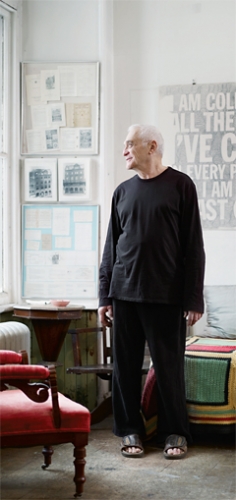Profession: Poet

Age : 73
Location: NYC
What are you working on right now? At the moment I am just finishing a piece about Garcia Lorca.
How do you view poetry? All art, and poetry being one, is wisdom. Pure wisdom arises in various forms.
Vegetarian? No.
All-time hero? My teacher, Dudjom Rinpoche.
Do you practice within a particular lineage? Well, yes indeed, very much the Nyingma tradition of Tibetan Buddhism, Dudjom Rinpoche and Longchen Nyingtik I feel very close to.
How did you get into dharma? I started taking LSD in 1964, and I realized when one had a good trip it was a good trip and if one had a bad trip it was not the fault of the drug, it was the fault of one’s mind. And somehow intuitively the way out of that was meditation practice—not using drugs but a way of training the mind. I started doing simple mantra practice, watching my mind and doing Vipassana. I didn’t get to India till 1970 or early ’71, when I met Dudjom Rinpoche and began formal practice.
Do you think the dharma in the West co-arose with the psychedelic movement? I think the 1960s was just a miraculous time. The middle classes were very rich for the first time in history, broadly and innocently rich, and everyone was educated from compulsory education for a century, and education and affluence and somehow drugs got into the mix, but not one of them is the cause, it’s just sort of the time when awareness opened up.
I heard a rumor that you took Dudjom Rinpoche to an S & M show when he visited the West in 1976?[Laughs] No, I didn’t, but I had the good fortune of tagging along. It wasn’t an S & M show, it was just sort of one of these peep shows. Dudjom Rinpoche, like all enlightened beings, was like a child. It was all just play—there was no bad and good. And I just thought, this is so great for the woman behind the screen to have the blessings of this great lama who was offering her great compassion. It was all really relaxed, and we were all sort of a bit invisible. It was totally wonderful.
What was Dial-A-Poem? In 1968, I got the idea that the telephone was a venue for poems. We had like twelve telephone lines and many, many poets on each machine reading prerecorded poems. People could just call this number for ten cents, and got [to hear] these poems. We got millions of phone calls. We got Allen Ginsberg and William Burroughs and John Ashbery and Frank O’Hara, Gary Snyder, and Trungpa Rinpoche at one point. That’s the first time telephone was used for mass communication—in terms of connecting a number with publicity and content to access an audience of millions of people.
Can you tell me the history of your New York home, known as the bunker? I started coming here to the Bowery in 1962, during the scene of the early sixties, when Andy Warhol and the pop artists were around and nobody was famous. William Burroughs needed a place in ’74 when he moved back to New York, and one became available here; the bunker was the locker room of the YMCA —it was just used for storage. So William got the bunker and lived there until he moved to Kansas in the early ’80s, but he kept coming back until he died. I’ve had it since he moved to Kansas. It’s a loft, so I made a shrine room for all Tibetan lamas. My teachers—like Dodrupchen Rinpoche, Khenchen Palden Sherab Rinpoche, Khenpo Tsewang Dongyal Rinpoche, and His Holiness the Sakya Trinzen—have all given teachings here. Many teachers gave teachings here. It’s not a center—I just use it for whatever is needed in any moment. It’s samsara or nirvana.
I’m going to say a word or phrase followed by one of the five deadly sins (based on the five Buddhist precepts), and you respond with whatever comes to mind.
What’s the best long-life practice (Killing)? The best long-life practice would be not to kill.
Honesty (Lying)? The purity of mind doesn’t lie.
Generosity (Stealing)? Generosity. What arises from generosity is the purity of mind.
Drug of choice (Intoxication)? Intoxication? Why not? Drug of choice? Grass.
Free love or monogamy (Sexual misconduct)? Free love and monogamy often go hand in hand. Actually, I don’t think there is often a difference or anything changes. So I think they are both one.
Do you think dharma in America has changed? Is it stiffer than the olden days? When I first went to India, I had no idea what I was doing, it was almost out of desperation, in terms of taming one’s mind, and there was no precedent. In the passing of these forty years dharma has so changed, and it’s accessible in a wonderful way, so that people who are interested don’t have to go through enormous torture; they can just follow their propensity to whatever teaching is available to everyone. I think that’s a great accomplishment.
What’s it like to be John Giorno? I have no idea. I’m just the guy who somehow turned out to be 73.
—Isaiah Seret
Thank you for subscribing to Tricycle! As a nonprofit, we depend on readers like you to keep Buddhist teachings and practices widely available.